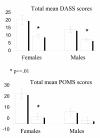Vegetarian diets are associated with healthy mood states: a cross-sectional study in seventh day adventist adults
- PMID: 20515497
- PMCID: PMC2887769
- DOI: 10.1186/1475-2891-9-26
Vegetarian diets are associated with healthy mood states: a cross-sectional study in seventh day adventist adults
Abstract
Background: The physical health status of vegetarians has been extensively reported, but there is limited research regarding the mental health status of vegetarians, particularly with regard to mood. Vegetarian diets exclude fish, the major dietary source of eicosapentaenoic acid (EPA) and docosahexaenoic acid (DHA), critical regulators of brain cell structure and function. Omnivorous diets low in EPA and DHA are linked to impaired mood states in observational and experimental studies.
Methods: We examined associations between mood state and polyunsaturated fatty acid intake as a result of adherence to a vegetarian or omnivorous diet in a cross-sectional study of 138 healthy Seventh Day Adventist men and women residing in the Southwest. Participants completed a quantitative food frequency questionnaire, Depression Anxiety Stress Scale (DASS), and Profile of Mood States (POMS) questionnaires.
Results: Vegetarians (VEG:n = 60) reported significantly less negative emotion than omnivores (OMN:n = 78) as measured by both mean total DASS and POMS scores (8.32 +/- 0.88 vs 17.51 +/- 1.88, p = .000 and 0.10 +/- 1.99 vs 15.33 +/- 3.10, p = .007, respectively). VEG reported significantly lower mean intakes of EPA (p < .001), DHA (p < .001), as well as the omega-6 fatty acid, arachidonic acid (AA; p < .001), and reported higher mean intakes of shorter-chain alpha-linolenic acid (p < .001) and linoleic acid (p < .001) than OMN. Mean total DASS and POMS scores were positively related to mean intakes of EPA (p < 0.05), DHA (p < 0.05), and AA (p < 0.05), and inversely related to intakes of ALA (p < 0.05), and LA (p < 0.05), indicating that participants with low intakes of EPA, DHA, and AA and high intakes of ALA and LA had better mood.
Conclusions: The vegetarian diet profile does not appear to adversely affect mood despite low intake of long-chain omega-3 fatty acids.
Similar articles
-
Restriction of meat, fish, and poultry in omnivores improves mood: a pilot randomized controlled trial.Nutr J. 2012 Feb 14;11:9. doi: 10.1186/1475-2891-11-9. Nutr J. 2012. PMID: 22333737 Free PMC article. Clinical Trial.
-
Protective effects of fish intake and interactive effects of long-chain polyunsaturated fatty acid intakes on hip bone mineral density in older adults: the Framingham Osteoporosis Study.Am J Clin Nutr. 2011 May;93(5):1142-51. doi: 10.3945/ajcn.110.005926. Epub 2011 Mar 2. Am J Clin Nutr. 2011. PMID: 21367955 Free PMC article.
-
Dietary supplementation with eicosapentaenoic acid, but not with other long-chain n-3 or n-6 polyunsaturated fatty acids, decreases natural killer cell activity in healthy subjects aged >55 y.Am J Clin Nutr. 2001 Mar;73(3):539-48. doi: 10.1093/ajcn/73.3.539. Am J Clin Nutr. 2001. PMID: 11237929 Clinical Trial.
-
Omega-3 fatty acid biochemistry: perspectives from human nutrition.Mil Med. 2014 Nov;179(11 Suppl):82-7. doi: 10.7205/MILMED-D-14-00147. Mil Med. 2014. PMID: 25373090 Review.
-
Alpha-Linolenic and Linoleic Fatty Acids in the Vegan Diet: Do They Require Dietary Reference Intake/Adequate Intake Special Consideration?Nutrients. 2019 Oct 4;11(10):2365. doi: 10.3390/nu11102365. Nutrients. 2019. PMID: 31590264 Free PMC article. Review.
Cited by
-
Dietary issues inpatients face with being vegetarian: an integrative review.Holist Nurs Pract. 2012 Jan-Feb;26(1):30-7. doi: 10.1097/HNP.0b013e31823bfec2. Holist Nurs Pract. 2012. PMID: 22157507 Free PMC article. Review.
-
Characteristics of Slovenian Adults in Community-Based Whole-Food Plant-Based Lifestyle Program.J Nutr Metab. 2020 Jul 29;2020:6950530. doi: 10.1155/2020/6950530. eCollection 2020. J Nutr Metab. 2020. PMID: 32802500 Free PMC article.
-
Lifestyle Adjustments in Long-COVID Management: Potential Benefits of Plant-Based Diets.Curr Nutr Rep. 2021 Dec;10(4):352-363. doi: 10.1007/s13668-021-00369-x. Epub 2021 Sep 10. Curr Nutr Rep. 2021. PMID: 34506003 Free PMC article. Review.
-
Depression, Anxiety, Emotional Eating, and Body Mass Index among Self-Reported Vegetarians and Non-Vegetarians: A Cross-Sectional Study in Peruvian Adults.Nutrients. 2024 May 29;16(11):1663. doi: 10.3390/nu16111663. Nutrients. 2024. PMID: 38892596 Free PMC article.
-
Regulation of rat brain polyunsaturated fatty acid (PUFA) metabolism during graded dietary n-3 PUFA deprivation.Prostaglandins Leukot Essent Fatty Acids. 2011 Dec;85(6):361-8. doi: 10.1016/j.plefa.2011.08.002. Epub 2011 Aug 30. Prostaglandins Leukot Essent Fatty Acids. 2011. PMID: 21880477 Free PMC article.
References
-
- Key TJ, Fraser GE, Thorogood M, Appleby PN, Beral V, Reeves G, Burr ML, Chang-Claude J, Frentzel-Beyme R, Kuzma JW, Mann J, McPherson K. Mortality in vegetarians and nonvegetarians: detailed findings from a collaborative analysis of 5 prospective studies. Am J Clin Nutr. 1999;70:516S–524S. - PubMed
-
- Rosell MS, Lloyd-Wright Z, Appleby PN, Sanders TA, Allen NE, Key TJ. Long-chain n-3 polyunsaturated fatty acids in plasma in British meat-eating, vegetarian, and vegan men. Am J Clin Nutr. 2005;82:327–334. - PubMed
MeSH terms
Substances
LinkOut - more resources
Full Text Sources
Medical
Research Materials


